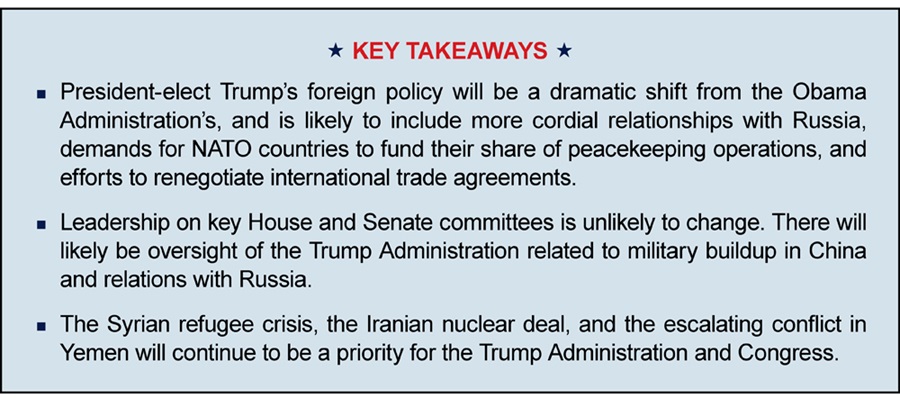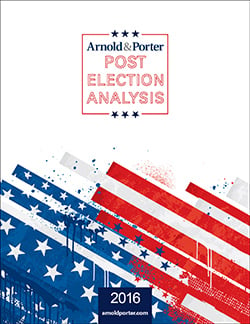Post-Election Analysis 2016: Foreign Affairs

Administration Priorities
Under the Trump Administration, foreign policy will be undergoing a sea change from the Obama Administration. We expect President-elect Trump to prioritize a few foreign relationships, notably the United Kingdom, where the Brexit vote forced a leadership change in government. Cultivating a relationship with the United Kingdom's Prime Minister also serves as a quick check on the European Union (EU), where Trump skepticism is quite high.
As for China, President-elect Trump is likely to initially seek a much harder line against the country that will reshape American relations with other countries worried about China's growing sphere of influence. Some American diplomatic and military resources also will be newly focused on Russia's resurgence.
We expect President-elect Trump's foreign policy agenda to focus on five key principles:
- Focusing military assets on winning the War on Terror and pursuing terrorist organizations wherever they reside;
- Restraining other military intervention to instances where American interests are directly threatened;
- Revamping trade policy to more broadly represent American economic interests;
- Recasting relationships with Russia and China to check their growing influence in world events; and
- Restricting the proliferation of weapons of mass destruction by Iran and North Korea.
In an environment where the American military faces high-tech threats from Russia and China along with low-tech warfare from a range of terrorist organizations, we expect President-elect Trump to work with Congress to increase long-term defense spending, handle needed procurement reform, and rebuild American military capabilities.
CONGRESSIONAL LEADERSHIP
House. Rep. Ed Royce (R-CA) will continue to chair the House Foreign Affairs Committee (HFAC), a post he has held since January 2013. Rep. Eliot Engel (D-NY), ranking member of the committee since 2013, also will retain his position.
Rep. Kay Granger (R-TX) has chaired the Appropriations Subcommittee on State, Foreign Operations, and Related Programs since 2011, but she has expressed interest in becoming chair of the Subcommittee on Defense in the 115th Congress. Should she move to the Defense Subcommittee, Rep. Mario Díaz-Balart (R-FL) will be the most senior Republican on the State, Foreign Operations, and Related Programs Subcommittee. Rep. Nita Lowey (D-NY) will retain her post as ranking member of the subcommittee.
Senate. Sen. Bob Corker (R-TN) will chair the Senate Foreign Relations Committee (SFRC). If Sen. Bob Corker (R-TN) is appointed to a position in President-elect Trump's Cabinet, the gavel will likely go to Sen. Jim Risch (R-ID), the second most senior Republican on the committee. Sen. Ben Cardin (D-MD) will remain the ranking member, a position he held in the 114th Congress.
Sen. Lindsey Graham (R-SC) is expected to remain in his position as chair of the State, Foreign Operations, and Related Programs Subcommittee. Similarly, Sen. Patrick Leahy (D-VT) is expected to remain on as the subcommittee's ranking member.
CONGRESSIONAL PRIORITIES
Rep. Ed Royce has demonstrated a commitment to the cause of global human rights, which will likely be a continued focus for the House Foreign Affairs Committee. In response to the State Department's confirmation that its $400 million payment to Iran was conditioned on the release of American prisoners, he sponsored the Prohibiting Future Ransom Payments to Iran Act (H.R. 5931), which passed the House by a vote of 254 to 163, but stalled in the Senate. Under his leadership, the committee could use its oversight authority to review Iran's implementation of the nuclear accord.
On the appropriations side, Rep. Kay Granger is likely to continue to seek decreased spending on foreign assistance. The geographic distribution of foreign assistance funds is heavily concentrated in Africa, particularly throughout Sub-Saharan Africa, and in parts of Southwest and Southeast Asia. The House Appropriations bill set funding levels for FY 2017 at $595 million below FY 2016 and $691 million below the President's budget request.
President-elect Trump has praised Russian President Vladimir Putin for his strength and leadership. He has stated that German Chancellor Angela Merkel is his favorite world leader, but he nonetheless criticized her for allowing a large number of refugees into her country (476,000 Syrian refugees received asylum in Germany in 2015).
President-elect Trump, in addition to being critical of other North Atlantic Treaty Organization (NATO) countries' support levels, has said he would like to see NATO's priorities shift away from Russian deterrence toward combating international terrorism and migration. A Republican Congress is not likely to support the President-elect's threat of withdrawal from NATO, but Republican leaders could take a closer look at the balance of indirect spending among NATO partners.
Syria. President-elect Trump has expressed concern regarding the Syrian refugee crisis, and has not called for the ousting of Syrian President Bashar Al-Assad, arguing that Russia and the Syrian leader should be allowed to continue fighting the Islamic State in Syria (ISIS). In contrast to President-elect Trump's call for "extreme vetting" of all immigrants, including Syrian refugees, Reps. Royce and Eliot Engel, the Chair and Ranking Member of the HFAC, have called for restricting resources to the Assad regime in response to the "[annihilation] of its own people." On the Senate side, SFRC Chair Bob Corker has expressed concerns about Russian activity in Syria, and criticized the Obama Administration for failing to resolve the issue or reach a successful ceasefire. The conflict in Syria is likely to continue to force Russia and the US to the negotiating table again, with world leaders, including German Chancellor Angela Merkel and French President François Hollande, who are pressing for a ceasefire. While Republican leaders in Congress may disagree with the administration's approach to Syria and the refugee crisis, the President-elect will have wide latitude to act on his campaign promises.
Russia. Republican leaders in Congress do not share President-elect Trump's views on US relations with the Kremlin. HFAC Chair Rep. Royce has said that Russia and President Putin's interests conflict directly with those of the US. He has also been critical of the Obama Administration for trying too hard to cooperate with Russia. Similarly, SFRC Chair Bob Corker criticized Obama Administration Secretary of State John Kerry for "laying prostrate" in front of Russia, and will be unlikely to look favorably upon strengthening ties between the US and the Kremlin. Sen. Corker's views on Russia may mean he is more likely a pick for the Treasury spot in the Trump Cabinet, rather than State.
China. President-elect Trump has been critical of China with respect to its economic policy and expansion efforts in the South China Sea. He said he will label China a currency manipulator, crack down on hacking efforts, and threaten the Chinese government with increased tariffs unless current trade agreements are rewritten. The President-elect has outlined a policy that will instruct the US Trade Representative to bring trade cases against China in the US and at the World Trade Organization to contest China's subsidy policies that favor Chinese companies and give them a competitive advantage in global trade, to the detriment of US interests.
President-elect Trump has said he would expand US military presence in the South China Sea as a deterrent to China's territorial claims in the region. HFAC Chair Royce and SFRC Chair Corker have also expressed concerns about Chinese actions in the South China Sea, but would likely oppose a military buildup and could withhold funding as a check on the power of the Executive Branch. Rep. Royce has also been a champion of expanding human rights and freedom of information in China and throughout Asia as a counterweight to China's influence in the region.
Iran. Sen. Corker supported the 2015 Iran nuclear agreement, but Rep. Royce has repeatedly expressed concerns about a nuclear Iran and what it could mean for the US. Whether the deal is renegotiated, we can expect to see a shift in US relations with Iran under the Trump Administration.
Many Republicans in the House and Senate opposed the Obama Administration's 2015 nuclear deal with Iran, and HFAC Chair Ed Royce is expected to introduce a renewal of the 1996 Iran Sanctions Act (ISA), which is due to sunset on December 31, 2016. The ISA, including several subsequent amendments to it such as 2010's Comprehensive Iran Sanctions Accountability and Divestment Act, provides a statutory basis for many of the sanctions that were imposed on Iran to combat nuclear proliferation. While the House is expected to push for a vote on the renewal before the ISA expires, it is less clear how the Senate will react. Assuming there are no new sanctions in the renewal legislation, it is likely that the measure will be approved with strong bipartisan support. The Obama Administration, however, has made clear that it does not believe the measure is necessary, stating that although the ISA has expired, it allows the President and the Treasury Department to retain the ability to reinstate sanctions if Iran violates the nuclear agreement.
While Rep. Ed Royce hopes to move the ISA before the next Congress, reactions to President Obama's landmark nuclear deal will continue into 2017. The Prohibiting Future Ransom Payments to Iran Act (H.R. 5931) passed the House in 2016, and would prohibit future cash payments to Iran for any reason. Rep. Ed Royce referred to the payment as "dangerous," and has made clear that preventing any future payment is a priority for him. This legislation is not likely to continue to move this year, but could arise again next year.
Yemen and the Persian Gulf. For over a year, Yemen has been engulfed in a series of conflicts that have pushed it to the edge of civil war. The conflict, fought mainly between the Yemeni government and Zaidi Shia rebels known as Houthis, has escalated since September 2014, when Houthis took control of Yemeni capital Sanaa. This led to formation of a coalition of Arab states intervening on behalf of the government and President Abdrabbuh Mansour Hadi.
In October, 2016 the Saudi-led campaign conducted airstrikes killing more than 140 people in Yemen. The US sent Navy warships to the area, and just one week later the ships were targeted (though not struck) by the Houthi rebels. The US responded by initiating its own airstrike against coastal radar sites in Houthi-controlled Yemeni territory. While the US has been indirectly involved in the conflict for some time (without any troops on the ground) this incident is likely to focus attention of both the Trump Administration and Congress on the region.
The Obama Administration announced plans to review its support to the Saudi-led coalition following the recent attacks. It is difficult to predict what will happen with the Trump Administration in the Red Sea or elsewhere in the region. Both House Foreign Affairs Committee leaders have spoken out against the Houthi rebels, and against Iran for its support of them. Until this point they have advocated only for logistical and intelligence support in the area, but it is possible this could shift in light of the strikes against US warships. We can also expect congressional leaders to be concerned about the humanitarian crisis the conflict has created and lack of civilian protections.
Our full analysis of the 2016 election is available below.
*Anna Noone contributed to this analysis Ms. Noone is an Administrative Assistant in Arnold & Porter's Legislative and Public Policy practice. Ms. Noone is not admitted to the bar.


